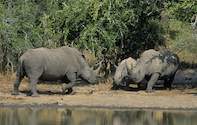
Auctioning the Right to Conserve
In 2014, the Kruger National Park had allegedly sold 260 rhinos to three hunting safari companies in the Northern Cape for safekeeping. The park confirmed that a total of 500 rhino are to be relocated to other parks, private game reserves or neighbouring countries in an effort to save the species from excessive poaching in the Kruger.
Questions were raised about the decision to sell these rhino to areas where they could possibly be part of hunting activities, and this point is argued against the high poaching statistics in the Kruger Park. The money received from the sale of rhinos to private owners goes towards rhino conservation.
In 2013, Namibia held an auction that raised many ethical questions by pro- and anti-hunters alike. The auction aimed to raise money that would go towards the costly efforts to save the existing rhino populations from extinction - by auctioning a legal hunting permit for the scarcer of the two African rhino species, the black rhino.
Selling the rights to hunt an endangered species was something that was never done before, but it was believed to be beneficial in the long run, as it raised a considerable amount that would go towards the fight against rhino poaching. The hunt would take place in the Mangetti National Park in Namibia.
The Dallas Safari Club was the organizer of the event and the club's executive director, Ben Carter, explained that the decision was made considering the larger population. He said that the hunt would cull an aggressive rhino that shows threat to the larger herd, and that wildlife experts consider this an acceptable habitat management practice.
Dying for Conservation
The Kruger National Park Veterinary Wildlife Services Unit had been busy catching rhino for one of its annual rhino auction that was held on March 12, 2005. The park had hoped to sell about 20 white rhino, some from the holding bomas and others on catalogue. Rhinos of both sexes were sold.
According to Dr Markus Hofmeyr, Head of Veterinary Wildlife Services, "SANParks is swapping one biological asset for another." This is because the proceeds from the sale of the rhino go into a special fund that is used to acquire more land for national parks and for dedicated conservation projects. Dr Hofmeyr said that the rhino are mostly captured from areas on the periphery of the park where they would be most at risk from poachers.
They also target areas where there is a high population density, as in these areas the male rhino sometimes injure or kill each other during their social interactions. Any rhinos that are caught that do not acclimatise rapidly to the bomas are released back into the park.
Rhino prices stood at about R120, 000 per animal in 2005, with females reaching higher prices than males, and cowcalf pairs usually being in high demand. The price of white rhino has declined over the years as the number of rhino in private nature reserves has increased. The record price of a rhino sold in the park stood at about R330, 000 in 2005.
References
News24https://www.news24.com/Green/News/Namibia-rhino-hunt-auction-draws-death-threats-20140109
https://www.news24.com/SciTech/News/Kruger-rhinos-up-for-sale-20060206
Africa Geographic
https://africageographic.com/blog/sanparks-allegedly-sold-rhinos-to-hunting-farms-for-safekeeping/

